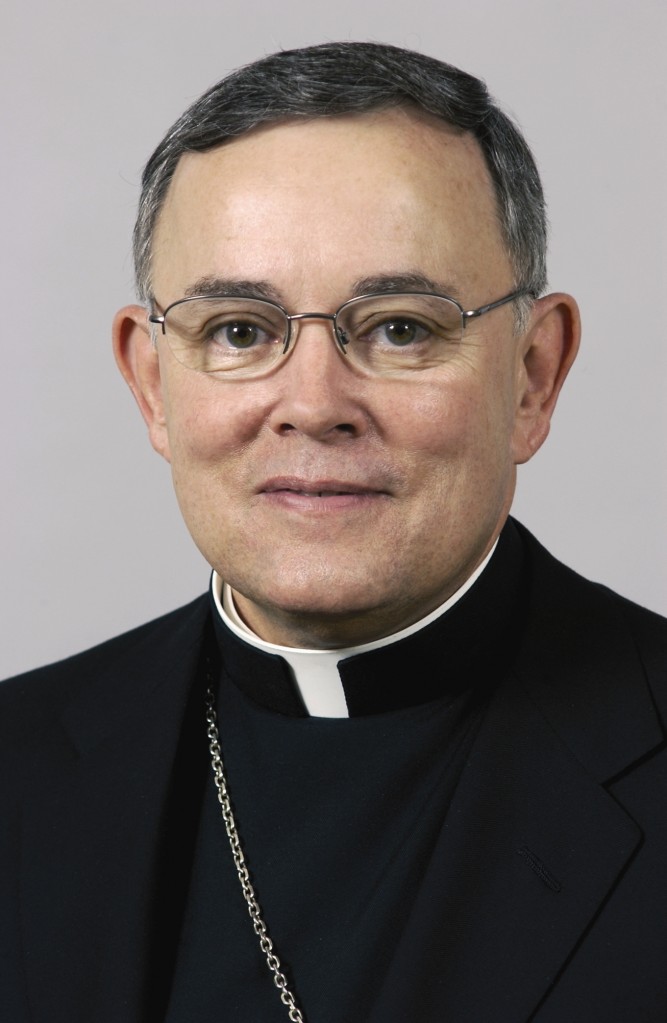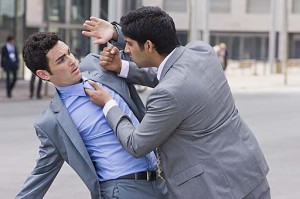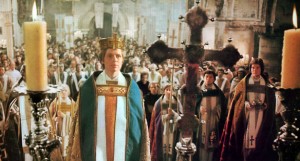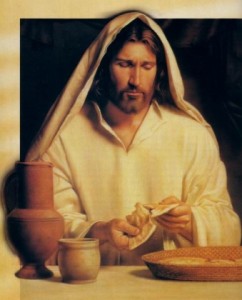Welcome to Philly, Archbishop Chaput!
July 19, 2011 by admin
Filed under Blog, Faith, Fatherhood, manliness, Scriptural Examples, Virtue
Okay, so he’s not here yet (will be installed on Sept 8, 2011), but the faithful in Philadelphia are very excited to welcome him! Archbishop Chaput is an incredible shepherd and has always been wonderful to me on a personal level. I had the privilege of meeting him while in college; while still an anti-Catholic/sola scriptura/ evangelical. I then was able to meet him several more times, post reversion, working with FOCUS (The Fellowship Of Catholic University Students) and then on a more personal note when I was Director of Catholic Campus Ministry at the Air Force Academy; he was always wonderful about coming to the Academy to speak to the Catholic cadets. His leadership is second to none, but his humility is that of Christ. He is an incredible man and we are blessed to have him as our new archbishop.
Archbishop Chaput is an incredible shepherd and has always been wonderful to me on a personal level. I had the privilege of meeting him while in college; while still an anti-Catholic/sola scriptura/ evangelical. I then was able to meet him several more times, post reversion, working with FOCUS (The Fellowship Of Catholic University Students) and then on a more personal note when I was Director of Catholic Campus Ministry at the Air Force Academy; he was always wonderful about coming to the Academy to speak to the Catholic cadets. His leadership is second to none, but his humility is that of Christ. He is an incredible man and we are blessed to have him as our new archbishop.
(Our journeys are similar… from Kansas, to Colorado, to Pennsylvania. And, I hear he’s a Steelers fan!)
Here’s an interview with him from Catholic News Agency…
Q: You must have some interesting thoughts about being appointed to the See where the Declaration of Independence was written, the “City of Brotherly Love” where the first American male saint — St. John Neumann – was bishop.
A: I don’t think it’s real for me yet. I could give you half a dozen reasons why other men might be more qualified, and why I’m the implausible choice. But I do believe in the Holy Father’s wisdom, so I accept that the See of Philadelphia is where God wants me to be. My life as a priest – first as a Capuchin Franciscan and now as a bishop – is shaped by a commitment to obedience; obedience to God as Father. The voice of the Pope is the voice of the Father for me.
I’m going to miss the Archdiocese of Denver very, very much. Colorado has been home to me for 14 years. The priests and people there have been unfailingly generous. They really are my family, and a part of my heart will always be in Denver.
But I look forward to embracing the new family that God is giving to me, the family that is the Church of Philadelphia. Over the years I have had many friends, both priests and laypeople, with roots in Philadelphia, and I’ve always been struck by their faith and their goodness. So it’s a great privilege to be sent there. The fact that Philadelphia is where of the Declaration of Independence was signed and the center of so much of our country’s early history, means a great deal to me. I think the United States has been blessed by God in unique ways. Because of that blessing, America has a duty to be a blessing for the world and for all people. I also think that words like “the City of Brotherly Love” should be more than just a good tourist slogan. Philadelphia is one of this country’s truly great cities, and I want to be part of renewing and deepening the best in this community.
I’ve been praying to St. John Neumann a lot since getting the news. I want to love the priests and people of Philadelphia with the same zeal he brought to his ministry. At least I can guarantee that no one will work harder, or try harder, than I will.
Q: What are the main challenges you might face in your pastoral mission?
A: The biggest challenge, not just in Philadelphia but everywhere, is to preach the Gospel in a way that captures the imagination of God’s people. The biggest task that lies before us is evangelization. We need to have confidence in the Gospel. We have to live it faithfully, and to live it without compromise and with great joy.
The Church in Philadelphia is at an important point in her life. It’s not a time to be embarrassed about what we believe. In fact, it becomes even more crucial to preach the Gospel – both within the Church and outside the Church.
Q: Regarding the grand jury report and allegations involving the clergy, what needs to be done in restoring the mission and the morale of the priesthood? What are your ideas about the priesthood, and also the relationship with the laity?
 A: I haven’t read the grand jury report yet, and it will be awhile before I fully understand the issues. I need to hear from the people involved in these matters and to learn the facts before I comment.
A: I haven’t read the grand jury report yet, and it will be awhile before I fully understand the issues. I need to hear from the people involved in these matters and to learn the facts before I comment.
I do know that priests’ morale across the country has been seriously wounded by the abuse scandal. I’m sure the priests of Philadelphia carry this burden in their own unique way. But we know that Jesus, when he chooses men to be priests, chooses them with a brother’s love, and I want to be a sign of that love to my brothers. We have to deal with scandal in an honest, thorough, confident way. We can do that, even when it’s very painful, because we know that Christ rose from the dead. “Jesus Christ is risen” — these aren’t just powdered words; they’re a statement of fact. That should give us confidence that what happens in the Church, even when it seems death-dealing, can be turned into a moment of resurrection.
Q: What catches your attention most about the local Church in Philadelphia?
A: I have a lot to learn about Philadelphia, but I’m eager to get started. I did live in western Pennsylvania for 10 years – first as a seminarian, then as a seminary professor, and eventually as a part of the administration of the Capuchin Province of St. Augustine based in Pittsburgh. My time in the state was delightful. I look back on it with great joy. The men and women of Pennsylvania that I’ve met are wonderful people; good, generous and creative. I look forward to being a part of their lives.
Q: You’re a Native American and quite proud of your heritage. Can you talk a little bit about your background, and what that means to you?
A: I’m Native American on my mother’s side. I’m a member of the Prairie Band Potawatomi tribe. Our reservation is in northeastern Kansas.
Being Indian was probably the entry point for my becoming a bishop. One never knows why one becomes a bishop, but my first assignment was the Diocese of Rapid City, South Dakota. I suspect I was sent there was because of my engagement with the Native American Catholic community in the United States. The Holy Father was looking for a way to reach out in special love to the native people. So I see my episcopacy, in some ways, as born from that part of who I am.
The Native American people – the original inhabitants of this land – are a very diverse group with many, many gifts. I’ve always hoped that through my service as a bishop, those gifts can be recognized by the Church all the more, and that the Church can better meet the needs of Native people.
I was blessed to be the first Native American archbishop, and my people were honored by that.
Q: You’re also a Franciscan Capuchin. St. Francis had a pretty radical approach to the Gospel, and the Capuchins were known as reformers within the Franciscan community. How does this shape how you see the Church’s task, and your role as a leader?
A: Francis was radical in the root meaning of the word “radical,” which means to go “to the root” of the matter. He wanted the friars to live the Gospel clearly, without compromise. The word he used was, “without gloss.” It was a custom, in the Middle Ages, to develop commentaries on the Gospel, and sometimes those commentaries would explain away the Christian’s responsibility to live the Gospel without compromise in every moment of our life. Francis rejected any kind of effort to diminish the demands of the Gospel.
Of course, I have to live that discipline personally in my own life. That’s the most important part of my Capuchin identity. But then I have to preach the Gospel in the same kind of way, in a way that’s clear, that’s always fresh, and always without compromise.
Before anything else, we’re called to be Catholics. That should be the defining part of who we are. Whether we’re Indians or Germans or Irish; whether we’re Democrats or Republicans, we are Catholic first. Everything else is secondary. Francis called his brothers not only to live that Catholic identity personally, but to preach that unvarnished Gospel with clarity. And I hope that my service as a bishop always enables me to do that.
Q: You’ve talked about this issue of Catholic identity frequently. Why is that so important to you? Is there something about American culture that encourages people to compartmentalize their faith from the rest of their lives?
A: Many of the dominant themes of our time work contrary to the Gospel. All of us who are Catholics are very much influenced by our culture and by our society’s criticism of the Gospel. Because of these pressures, Catholics are often tempted to be embarrassed by their faith, and to make decisions that are compromised by our desire to somehow please the world, while satisfying God. We often can’t do both. We always need to choose to please God first.
We need the support of the Church, the help of our brothers and sisters in faith, to live the Gospel in this difficult environment. That’s why I’ve spent so much time in these last years, as a bishop, writing and speaking about this. I want the Church to have confidence in the Gospel and Christians to support one another, regardless of the opposition to the Gospel in our culture.
We owe it to our country and the age we live in, to be faithful Catholics. If we’re good Catholics first, then we’re good citizens, and if we’re good citizens, then we’ll be a force of transformation for justice in the world. If we don’t live as faithful Catholics, we betray the Gospel. We forfeit the opportunity God gives us to make a significant difference for the evangelization of culture.
Q: Many Catholics now serve in Congress, in state houses, in governors’ mansions — we even find Catholics as a majority on the Supreme Court. But we often don’t see the content of Christian social teaching reflected in society. Does this relate to that issue of Catholic identity?
A: There’s an obvious temptation, in political life, to compromise Christian virtues and values because of the pressures of the society around us. But I wouldn’t first point to governors, or congressional representatives, or Supreme Court justices. I’d point to ourselves. If our political leaders lack conviction about their faith, it’s because the members of the Church lack conviction about their faith. Political leaders are no different from the rest of us. So if we point fingers at them, we’re also pointing fingers at ourselves, and at the broader Church community.
So the Gospel should be preached, first of all, in the Church. Naturally, we need to preach it to political leaders as well. But they’re not alone – not by a long shot — in their tepidity and compromises of the Gospel. If Catholics in their homes and parishes understand that, they’ll realize that a serious conversion needs to take place in all our lives, and not just in the lives of politicians.
Q: If this applies to every member of the Church, how do you think it applies to bishops? What do you think is the role of a bishop in American society?
A: A bishop, before he’s a bishop, is a Christian. And before he’s ordained, he’s baptized. So I think that anything that we say about Christians, we have to say about bishops, too. And bishops, because they’re raised up to be a sign of the presence of Christ in the Church, need to live the Gospel more clearly and more authentically, without compromise, than anyone else.
We can’t preach to others what we don’t embrace ourselves. And because we sometimes don’t practice these things ourselves, sometimes we’re embarrassed to preach these things to others. This is also why those who are called to preach the Gospel might sometimes be silent.
So I think that bishops always have to be engaged in the process of their own personal conversion – prior to calling others to conversion. At the same time, we can’t let our sins and our failures cripple us; otherwise the Apostles themselves would have stayed silent. We have to practice what we preach. But even if we don’t, we always have to preach the Gospel. And if we preach it to others, conscious that we need to be converted ourselves, then things really will begin to change.
Q: From your perspective as a bishop, where are we as a Church, and as a nation, on the issue of abortion?
A: I think that our country, in some special sense, is going to be judged by God on that issue. If we’re not able to protect the most vulnerable members of our society, then we aren’t living up to the public commitment we have as a nation to protect the life, liberty, and happiness of every individual. The unborn child certainly shares with us our human dignity, and has a right to those protections. That’s why I believe this remains one of the fundamental issues of our time. We can’t be a people of justice if we don’t protect the life of the unborn child.
This is, of course, just one of the pressing issues of our time. Also vitally important is the question of the meaning of marriage. Family life is the foundation stone of all community. It’s the first community that we’re born into. The health of our families will lead to the stability or weakening of our society.
The Church’s efforts today, to protect the traditional meaning of marriage, are on behalf of stable family life, for the sake of children. Marriage is a relationship of a man and a woman, in a stable and faithful way, for the sake of children. The most important thing for our development into mature adults is that we know that our fathers love our mothers and our mothers love our fathers. If we don’t know that, then a certain kind of instability enters our lives. Anything we do, as a country, to undermine that meaning of marriage, creates a danger – a clear danger – to the long-term health of our country.
Q: The fact that civil laws favoring so-called gay “marriage” have been approved in several places, in the last two years, has led some people to say that the Church, and especially the bishops, have “lost the argument” in the American culture. How do you think individual Catholics should approach this issue in their communities? And what is the right role of the institutional church and the bishops?
A: We only lose when we stop working and struggling for what we believe to be true. In a very general sense, the battle was “lost” the day after Golgotha. Except the disciples didn’t get the memo.
I don’t think we’ve lost the marriage issue at all. Even framing the question that way shapes the answer in a wrong direction, because the language of a debate conditions how we think. If we concede the language, we concede the issue. I do think we’ve been allowing ourselves to lose the marriage debate for years, rooted in our confusion about individual and community rights, and our fear of being portrayed as “against” other people. Catholic teaching on sexuality and marriage is for human dignity; it is for human happiness and the virtuous development of family and society. It is “against” only those behaviors that undermine those goals. When people try to frame Catholic belief as an intrinsic hostility for individual persons or groups, they are not being honest.
Cohabitation today without marriage is quite common, with children being born outside the context of married love, and many people are confused about what marriage really means. Generally, people think “marriage” means a loving relationship between two people that has a sexual component. But that’s not what marriage means. It means a specific kind of loving relationship, for the sake of children. And the more we’re confused about that, the more damage we do to ourselves. So we need to have confidence in our faith and keep fighting this fight with a spirit of serenity. The Gospel is true, and the Church is right about the purpose of human sexuality, whether our critics like the message or not. So much is at stake –not just the moral teaching of the Church, but the health of our communities and our country. If we love our country, that means we fight for the things that protect our country and make it strong.
Q: Four years ago you wrote a book on Catholic political and social engagement, “Render Unto Caesar.” If you had to write that book today, would it have a different accent? In other words, what issues look most important to you today for Catholic political involvement in the United States, and in general, Catholic involvement in the public square?
A: When I wrote that book, four years ago, I was responding to a request from a friend – a young husband and father — who had run for state office, but found it troubling because of the pressure in party politics to embrace issues contrary to Catholic belief. I wanted to engage Catholics in a reflection on their responsibility for our country, and how politics can never be separated from faith even though “separation of Church and state,” properly understood, is a principle that’s worked well in our country. My point is that separation of Church and state was never intended to mean that we separate our faith from our social, economic and political life.
I have a high regard for the book’s publisher, and we’ve talked about doing an updated edition of “Render Unto Caesar.” Since my appointment to Philadelphia, I’ve had a certain kind of enthusiasm for a new version. So, give me some time, and you never know. Maybe I’ll have some additional thoughts on faith and public in the 21st century.
Comment Response
December 23, 2010 by admin
Filed under Blog, cultural manliness, Faith, manliness, pornography, Virtue
 Not too long ago, I received a comment on a post called “Porn Proves Deadly” about a driver of a big rig who, while driving was streaming porn on his laptop, hit and killed a woman whose vehicle was disabled in the median. The comment was poorly written, unsubstantiated and downright unnecessary. I receive occasional comments like this and respond as I can. Typically, when I respond, I don’t hear back. Such was the case of this comment and its author. Here is his comment in red italics:
Not too long ago, I received a comment on a post called “Porn Proves Deadly” about a driver of a big rig who, while driving was streaming porn on his laptop, hit and killed a woman whose vehicle was disabled in the median. The comment was poorly written, unsubstantiated and downright unnecessary. I receive occasional comments like this and respond as I can. Typically, when I respond, I don’t hear back. Such was the case of this comment and its author. Here is his comment in red italics:
“While I’m not saying I’m pro-porn, I have to say that logically, you’re using a false correlation here. Some of the things you post I agree with, some I don’t, but saying that the reason he crashed was because of porn is just misleading. The reason he crashed is because he was being stupid and not paying attention to the road. It could have been porn, or a regular movie, or he could have been playing solitaire. It wasn’t the porn, it was his actions and negligence while he was driving.
Frankly, I don’t appreciate your attempts to whip up a fervor. Countless accidents happen because people text while driving, but I don’t see you talking about that here. As far as I can tell, you’re just trying to get people on your side with stories that have an untrue “if-then” correlation. That’s lying, and that, sir, is just plain unmanly.”
I then responded with the following, below in gray:
Thank you for your comment and continued visits to my site. I’m glad that you agree with me most of the time.  For those times when you don’t agree with me, as in this case, that is certainly your choice.
For those times when you don’t agree with me, as in this case, that is certainly your choice.
I have read over your comment, and after review of my post, I believe you are incorrect in your critique of my writing. Therefore, I am not approving your comment, which is my prerogative, here’s why:
I am not lying, pornography kills. I even wrote in there “sometimes figuratively, sometimes literally”. You are correct; it could have been any number of other distractions. It wasn’t. It was porn. This man was looking at porn and killed a woman. Besides, texting, or watching another movie, does not involve the chemicals in the brain the way that pornography (or any sexual activity or stimulus) does. The brain emits oxytocin during orgasm and oxytocin is a bonding agent. It is the same bonding agent between a mother and child at birth and during breastfeeding. This was not the man’s first time viewing porn, so the bonds that were created in his mind from previous exposure were firing at incredible speeds and it most likely caused such a stir that he lost all recollection that he was driving.
You are correct in saying that you don’t see me posting about the dangers of texting and driving. You simply didn’t see it. I posted on August 27, 2009 about it. The post came over from my old site, so the majority of the post is missing. Here’s the link… https://www.truemanhood.com/the-dangers-of-texting-and-driving. I suggest taking the link from the post and watching it on YouTube.
When you send a critique like this, do you homework first. Don’t call me a liar. Don’t criticize me when you don’t know what you’re talking about. My site is not intended to make everyone agree with me, it is intended to do 3 things. 1. Fight pornography and the dangers of pornography addiction. 2. Fight cultural manliness, the idea that the world tells a male. 3. Teach men about virtue and how to live virtue.
Why am I sharing all of this with you? For a few reasons:
- Because I believe that those of us that understand the Truth, must share the Truth! So often the world asks us to sugarcoat everything and water it down. I refuse. People are longing for the truth and desire badly to grasp it. (You simply can’t grasp a watered-down, sugarcoated false-truth… it’s all wet and slippery.)
- To remind the TrueManhood.com Blog readership of the 3 intentions of this site.
- To remind the men who read this site that we are striving for virtue.
- To ward off the nay-sayers.
- To challenge the “status quo” out there that is indifferent to pornography and the dangers associated with it. Apathy doesn’t change problems, it makes them worse.
- To show that being charitable doesn’t mean being an old, soggy dishrag that someone can wipe the ground with. Being charitable may offend or upset someone. Jesus offended many in His day.
I really do appreciate comments. And when someone has a legitimate question, concern or suggestion, I typically heed them. So, if you’ve got a comment, please pass it along. If it’s negative, poorly written, distasteful or something similar, I won’t be posting it.
TrueMan up!
“Womanpriests”, “Pope Joan”… and a side of PC
Lately, I’ve come across several stories, websites, conversations, etc. about ‘womanpriests’. [Some of the websites  claim to be in communion with the Roman Catholic Church. They aren’t. No matter their claims, they aren’t.] One story is about a movie that’s out, exclusively in Europe right now, about the legend of a female Pope that lived during the 9th century. This claim is unsubstantiated and completely fabricated. One story, which I saw posted on Facebook, spoke of a ‘womanpriest’ from the St. Louis area who is pregnant. “The first female Roman Catholic priest to be pregnant in history.” What is the obsession with women being priests?!?!
claim to be in communion with the Roman Catholic Church. They aren’t. No matter their claims, they aren’t.] One story is about a movie that’s out, exclusively in Europe right now, about the legend of a female Pope that lived during the 9th century. This claim is unsubstantiated and completely fabricated. One story, which I saw posted on Facebook, spoke of a ‘womanpriest’ from the St. Louis area who is pregnant. “The first female Roman Catholic priest to be pregnant in history.” What is the obsession with women being priests?!?!
 I think the obsession is the false understanding of freedom in our culture, mixed with a heavy dose of moral relativism, topped with a false sense of equality… served with a side of PC. In our culture, fairness has been turned into a “if they get one, I deserve one too” system. Society completely distorts the understanding of gender, gender roles, equality, fairness and the intention of God in regards to gender and sexuality. The world has turned everything into a competition and some people believe that in order to be considered ‘equal’, they must have the same opportunities as everyone else. Think about that – it doesn’t make sense.
I think the obsession is the false understanding of freedom in our culture, mixed with a heavy dose of moral relativism, topped with a false sense of equality… served with a side of PC. In our culture, fairness has been turned into a “if they get one, I deserve one too” system. Society completely distorts the understanding of gender, gender roles, equality, fairness and the intention of God in regards to gender and sexuality. The world has turned everything into a competition and some people believe that in order to be considered ‘equal’, they must have the same opportunities as everyone else. Think about that – it doesn’t make sense.
Why is it, that as soon as a man is allowed (created) to do something, some women automatically insist that they should be allowed to do the same? The insistance includes many such things that are outside the scope of a woman’s role. See, when a man is ordained a priest in the Catholic Church, he becomes the spouse of Mother Church. Plain and simple. No apologies here… politically correct or not.
Being politically correct is not Catholic. It’s not charitable, it’s not what Jesus did, it’s not what we should do. Being politically correct asks us to waterdown our faith, to become “tolerant” of everything that’s going on around us – whether morally acceptable or not. No thanks.
As always, I’m not diggin’ on women. I’m not trying to deify men. What I’m saying is that we were each created for something great, as a man or as a woman. Those things can be (and most likely are) different.
Stand up for the dignity of each person. Respect life. Respect what God created you for. Stand up for Truth. Stand up against the notion of tolerance. Ruffle feathers, if that’s what it takes. Christ wasn’t a fairweather prophet… He didn’t take the position of “acceptance”… See, what Christ did (which is what we are supposed to model our lives after) is that He loved sinners too much to allow them to stay where they were.
TrueMan up!
What We Should Be Most Thankful For
Happy Thanksgiving 2009 everyone! It’s quite easy for us to forget about things in our life that we are (or that we should be) thankful for. It’s easy to go through life taking for granted the wonderful blessings we have. Sometimes, especially when it seems like the entire world is falling apart around us, we can’t see the blessings. I tend to think that we can’t see those things because we can’t get past our own wants and desires and our attitude gets in our own way.
 What we should be most thankful for is the perfect blessing, the greatest gift… the Eucharist. Did you know that the world eucharist means thanksgiving? When you’re down and out, struggling and allowing your poor attitude to get in your own way, do you run to the Eucharist? When you’ve got everything going for you, and you are striving for holiness, do you run to the Eucharist? No matter where you are in life, or how good or bad your day has been, the Eucharist should be your stronghold. I think that men sometimes struggle with the teachings of the Eucharist because men are called to submit fully to Christ and this gift. Typically, men don’t like to submit; submission is a sign of weakness and loss of control. In this case, submission to Christ in the Eucharist is key! If you want to grow in TrueManhood and you want to live the virtue of love (the GREATEST VIRTUE!), run to the Eucharist!!!
What we should be most thankful for is the perfect blessing, the greatest gift… the Eucharist. Did you know that the world eucharist means thanksgiving? When you’re down and out, struggling and allowing your poor attitude to get in your own way, do you run to the Eucharist? When you’ve got everything going for you, and you are striving for holiness, do you run to the Eucharist? No matter where you are in life, or how good or bad your day has been, the Eucharist should be your stronghold. I think that men sometimes struggle with the teachings of the Eucharist because men are called to submit fully to Christ and this gift. Typically, men don’t like to submit; submission is a sign of weakness and loss of control. In this case, submission to Christ in the Eucharist is key! If you want to grow in TrueManhood and you want to live the virtue of love (the GREATEST VIRTUE!), run to the Eucharist!!!
Christ instituted this gift, a pure gift of Himself, to sustain us and to guide us. The Eucharist is the one part of our faith that unites us most intimately with Christ. We give thanks for this “bread from Heaven”, what the Church refers to as “the source and summit”. We tend to think of movie characters like William Wallace or Maximus Decimus Meridius when we think of leadership, sacrifice and real manliness. Christ outshines them; this gift was an incredibly hard sacrifice to make… the hardest ever. Christ lead the Church towards His Father through this miraculous gift. I invite you to learn about the Eucharist and then, as I stated above, run to the Eucharist!
For those who either aren’t Catholic or who aren’t educated Catholics, I want to encourage you to read what the Catholic Church teaches about the Eucharist. This is the MOST IMPORTANT ASPECT OF OUR FAITH and many believers don’t know about it nor could they explain it. To start learning, please click this link for more info.
Man up!
How Does a Single Man Live Love?
 I didn’t really speak to this in my previous post… how a single man lives love. I spoke about how a married man can live love and how he can show his wife love, but nothing specifically for a single man. Let’s dive in.
I didn’t really speak to this in my previous post… how a single man lives love. I spoke about how a married man can live love and how he can show his wife love, but nothing specifically for a single man. Let’s dive in.
[Let’s say that our single guy isn’t in a dating relationship, courtship or engagement.] He still follows the principles laid out in the Catechism (CCC 1822) about what charity is and he realizes that all he does should be out of love for God and love for neighbor. I think it’s easiest to understand this idea (of living love) if a single man lives life as a servant, with the intention of bringing glory to God. Essentially, a single man lives love the same way a married man does, he simply directs his love towards others differently; a married man has a wife and maybe children that he loves above all other humans – if you’re not a husband or a father you’ll understand what I mean if you become one.
Often times, the word love is distorted to mean something (only) having to do with romance and/or intimacy. Not true. Obviously, marital love tends towards romance/intimacy, but marital love should stem from the same foundation that God’s love (specifically, Christ’s love for us on the cross) does. This foundation is life-giving, selfless and sacrificial. It might be easier to get the distinction if we use the word charity in place of love. As we think about what a charity does (helps people, lends a tender hand, comforts, protects, continually thinks about the welfare of others, etc.) it might make it easier for us to understand what living charity means.
A verse to think about:
1 Corinthians 13:4-7 says: “Charity is patient and kind. It is not jealous, it does not boast. It is not arrogant or rude. Charity does not insist on its own way. It is not irritable or resentful. It does not rejoice in wrong, but rejoices in right. Charity bears all things, believes all things, hopes all things, endures all things.”
If you’re a single man, are you always patient? In traffic, at work, in line at the grocery store? Are you arrogant or rude? Do you think more of yourself than others based off petty worldview mentalities? Are you irritable? Easily frustrated, constant mood swings or uncontrollable rage? Do you rejoice in others failures or struggles? Think about your life in connection with this verse.
Man up!
How Does a Man Live Love?
 Recently, I was having a conversation with some friends about various topics. As we got into the conversation, somehow we got onto the topic of love. I said something to the effect of “… a husband needs to love his wife. He needs to live love.” One of my friends asked me, “How does a man live love?” He said, “We hear that all the time, but how does a guy actually do that? What does he have to do to live love?” It’s a valid question. Actually, it’s more than valid, it’s essential.
Recently, I was having a conversation with some friends about various topics. As we got into the conversation, somehow we got onto the topic of love. I said something to the effect of “… a husband needs to love his wife. He needs to live love.” One of my friends asked me, “How does a man live love?” He said, “We hear that all the time, but how does a guy actually do that? What does he have to do to live love?” It’s a valid question. Actually, it’s more than valid, it’s essential.
We’ve talked previously about love being the greatest of all the virtues. We’ve talked about love being a verb. Let’s put these together. If we possess the virtue of love (also referred to as charity), that means that we perform love 1. with ease 2. with joy 3. at every opportunity and 4. promptly. Once we possess the virtue of love, it’s second nature for us to perform. Notice that there is an action taking place – love is performed. Okay, so we’ve said that love is a virtue and that it requires an action. What is that action?
The Catechism of the Catholic Church explains it very clearly in paragraph 1822: “Charity is the theological virtue by which we love God above all things for His own sake, and our neighbor as ourselves for the love of God.” Love isn’t something intangible that happens to come along every once and awhile, love is for God and others.
As a husband, I can live out love by first loving God and then by loving my wife (for love of God). That means that I strive to do as God has done. This isn’t a sentence full of meaningless words. This means that all I do, everything I think and say, is geared towards and focused on God. The greatest example of how a man can live love is by looking to Christ on the cross. Self-sacrifice, service, humility, obedience. Do these things for your wife and you’ll be loving her.
Practical application: how can I sacrifice for my wife as a sign of love? The greatest gift, of laying your life down for a friend, isn’t necessarily what I’m hoping will happen here, but that’s the ultimate. Sacrifice can be as simple as letting her choose the restaurant you eat at, or what TV show to watch or which song to listen to on the radio. Putting your preferences last.
It’s possible, that for each guy, love means something just a little bit different. In the end, it comes down to loving God and loving others.
Man up!
7 Days of Virtue; Day 7 – Love
Think of virtues like your muscles. You work your muscles out so that they can perform for you when needed. Virtue is the same way. You practice, work on the virtue and then, when the time comes, the virtue is there and ready.
Day 7 of the 7 Day Journey through the Virtues: DAY 7 – LOVE.
Love, also called charity, is the form of all virtue. Love is friendship with God and love leads us to God. An important aspect of love is that it is a verb; it requires action from us. To perform acts of love, we must surpass our own abilities; we require supernatural grace. (Supernatural = super –> beyond… natural –> nature… beyond our nature.)
Society often tells us that love is something that we get, instead of something we give. We’re often told to seek it for our good, instead of the good of another. This leads us to selfishness and seeking our our passions, desires and wants. Instead, we should love unconditionally, especially our spouse and our children – making a freely given gift of ourselves and our lives. Love brings us:
-
Joy – seeing love in others.
-
Peace – right relations, when we are united (or under reconciliation)
-
Mercy – a compassionate heart for another’s unhappiness. (The greatest virtue in relation to others.)
Love also occurs in:
- Passion – the desire for something.
- Natural virtue – when you want what is best for someone else.
- Theological virtue – the Holy Spirit dwelling in us.
Man up!




